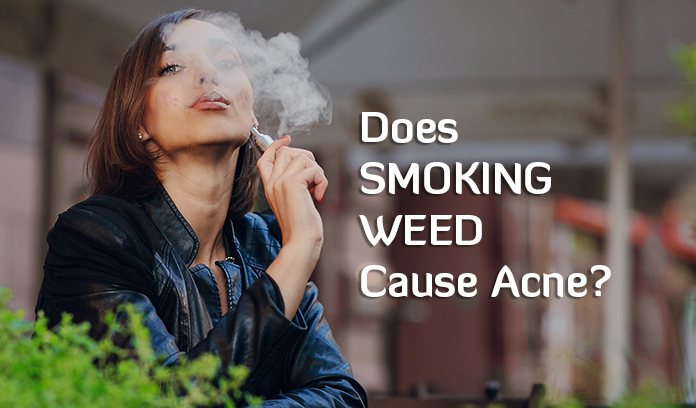If you’re exploring the world of cannabis, you might be tempted to ask the question: “Does smoking weed cause acne?”
Let’s delve further into this and navigate the potential impacts of marijuana on your skin.
What is Weed, and What Does It Do?
Weed, scientifically known as cannabis, is a plant that contains various compounds, with delta-9-tetrahydrocannabinol (THC) being the most well-known.
THC is responsible for the psychoactive effects that many associate with the use of marijuana. Besides its recreational purpose, cannabis has been explored for potential medicinal benefits. Explore top medications for acne and how to use them.
Hormonal Imbalances: Puff or Pimple
Another concern related to acne is hormonal imbalances due to smoking weed. Research indicates that smoking weed can influence hormone levels, possibly leading to hormonal acne. Learn how to combat hormonal acne.
And so the question arises: Can smoking cause hormonal acne? The answer is a complicated interplay of various factors.
THC, an active compound in marijuana, can affect hormone production, potentially causing skin issues.
Maintaining a healthy lifestyle, and skincare regimen, and seeking professional help are essential for managing hormonal acne.
Smoking weed can impact mood swings
Apart from the physical aspects, marijuana can influence mood swings. The connection between mood and skin health is intricate, and while some individuals might experience heightened stress levels due to marijuana use, others may find relief. Understanding your body’s unique response is important.
Smoking weed can influence fertility outcomes
For those considering the impact of smoking weed on fertility, quitting may result in some positive changes. How long after quitting smoking weed does fertility improve? Studies suggest that sperm health may improve within a few months after quitting. So, if you’re planning to start a family, this might be something to consider.
Smoking weed has an impact on the kidneys
While the direct impact of smoking weed on the kidneys isn’t entirely clear, some studies indicate potential links between cannabis use and kidney problems. It’s crucial to consider the broader health implications when evaluating the relationship between smoking weed and acne.
Smoking weed affects blood circulation
Blood circulation is crucial for overall skin health. Some studies propose that smoking weed may influence blood circulation, potentially affecting the skin’s ability to regenerate and stay healthy.
In conclusion, to answer the question – Does smoking weed cause acne?
The link between the two is complex. While research indicates potential connections, especially with hormonal imbalances, the impact varies.
Quitting may improve skin health and fertility, but timelines also vary. Beyond acne, weed can affect mood swings, kidney function, and blood circulation, highlighting broader health considerations.
FAQs: Does smoking weed cause acne?
Can smoking cause hormonal acne?
Yes, smoking weed can potentially contribute to hormonal imbalances that may lead to acne. Cannabis use has been linked to changes in hormone levels, which can affect the skin’s oil production and contribute to acne development.
Will my acne clear up if I quit smoking?
Quitting smoking can have positive effects on your skin, and for some individuals, it may lead to an improvement in acne. However, the extent of improvement can vary from person to person, as factors like skin type and overall skincare habits also play a role.
How long after quitting smoking weed does my fertility improve?
Improvement in fertility after quitting smoking weed can vary. While some studies indicate that fertility improves within a few months of quitting, individual factors such as overall health, age, and other lifestyle choices also influence fertility outcomes.
Can smoking make my skin worse?
Yes, smoking, including weed, can contribute to skin problems. Smoking has been linked to poor skin health, as it can reduce blood flow and deprive the skin of essential nutrients. This, coupled with potential hormonal changes, can contribute to the worsening of skin conditions, including acne.
What helps hormonal acne?
Addressing hormonal acne involves a multifaceted approach. Consulting with a dermatologist is crucial, but lifestyle modifications such as a balanced diet, regular exercise, and proper skin care can also contribute to managing hormonal acne. Additionally, some individuals find relief through hormonal treatments prescribed by healthcare professionals.











